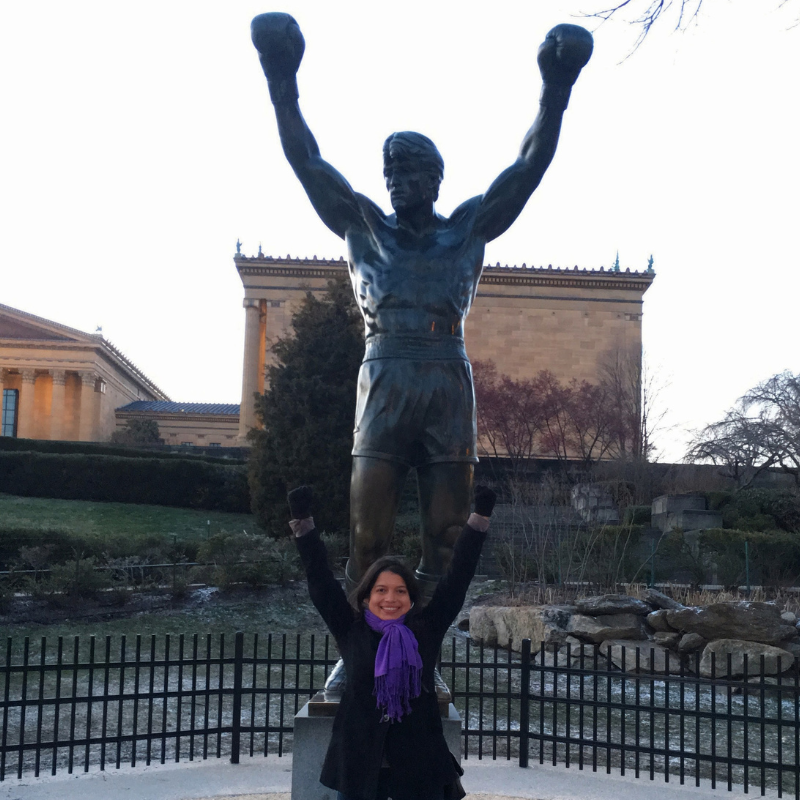September 12, 2023
Isha Triguero was an active sixteen-year-old who loved playing for her high school track team when, all of a sudden, she began suffering from extreme exhaustion. She could hardly run anymore, her joints ached, and she spent much more time in the house resting. A trip to the doctor revealed that Isha had lupus, an autoimmune disorder that causes the body to attack itself. Not even six months later, Isha’s kidneys failed and she began her life-long kidney journey.
Getting diagnosed with lupus
“My mom offered to give me her kidney right away but I was a kid in the 90’s and I didn’t have any education about kidney donation,” said Isha. “I thought she could die and the internet wasn’t big yet, so I didn’t have a way to learn about the risks. I decided to go on the transplant waitlist.”
Isha worked hard to balance high school and then college while getting hemodialysis three days a week, four hours each session.
“I tried not to think about my kidney failure by filling my day. I got up, did a full day at school, and went to work. I didn’t have time to think about my health until I was actually getting dialysis. On the way to the clinic and during my session, I’d get so mad. That didn’t make me the best patient. I went whatever days I was available because I was busy and eventually lost my dialysis seat. They put me in the corner but that didn’t impact me,” Isha said. “At that point, I was in college and doing homework anyway. As long as the tiny TV worked, I was fine.”
After three years, the routine became too much for Isha, and she agreed to receive her mother’s kidney.
“The first thing I wanted to know after waking up from the transplant surgery was if my mom was okay. She was but she experienced a lot of pain,” said Isha. “I felt so bad about that because I felt great almost immediately.”
Do you need a kidney transplant, or considering becoming a living donor? Check out our Kidney Learning Center for free online courses designed to help educate you on transplantation and living kidney donation.
Losing her new kidney
Just a few years later, Isha’s joy turned to shock and disappointment when she was diagnosed with cancer.
“I started getting stomach pain so I had tests and imaging done but doctors couldn’t find anything wrong. They said it was likely stress–I used to work as a higher-up in finance, a very stressful job, so I believed them,” Isha said. “I got so sick in 2015 that I stopped working for a few years but the pain didn’t go away even though my top stressor was gone. In March 2019 I ended up in the ER and was diagnosed with an aggressive form of cancer.”
Isha’s first question wasn’t about life expectancy or if she could be cured–it was about her transplanted kidney.
“When I was told I had cancer, all I wanted to know was if my kidney would make it through the cancer treatment. If my kidney would fail, I didn’t see the point of treating the cancer,” said Isha. “The trauma from dialysis was that intense.”
Despite her reservations, Isha began cancer treatment.
“I was upset but tried to use coping mechanisms to get through it. I read a lot of self-help books and had great support from my friends, family, and partner,” Isha said. “I was declared cancer-free in August 2019. My kidney didn’t fail but I still got back on the transplant waitlist in March 2021 because it could have at any point.”
That’s when Isha faced another blow–racism.
“First, I was told that multi-listing, where you can get on a transplant waitlist at multiple centers, was an option but no one told me what that meant or how to do it. Then I had issues with the center never calling me back. Twice I showed up for an appointment and waited for hours before anyone told me it had been canceled. When I finally got listed, I was put on hold but that wasn’t communicated to me,” Isha said. “I’m in a support group with many White members. I love them, but their story is very different from mine. One member was listed within 3 weeks at the same center where it took me six months. My coworker, who is Asian, also struggled to get listed at this center. He was the one who told me all about multi-listing.”
Learn more about social determinants of health.
With the help of her coworker, Isha got on the transplant waitlist for a center in Florida. A few weeks later, she got a call about a kidney waiting for her there. She hopped on a flight and received the transplant on May 7th, 2022 which is still going strong.
Did you know there is a formula that “scores” kidneys from Black deceased kidney donors less favorably than kidneys from non-Black individuals? It’s called the Kidney Donor Risk Index (KDRI). We believe using race and ethnicity in clinical calculations harms patients and perpetuates racism in kidney care. Join us in telling the Organ Procurement and Transplantation Network (OPTN) to remove race from the KDRI. By advocating for KIDNEY EQUITY FOR ALL™, we are helping to create a healthcare system that values diversity, promotes inclusion, and ensures that everyone has an equal chance at a healthy life, regardless of their ethnicity or cultural background.
Becoming an advocate

Isha is committed to sharing what she’s learned about kidney disease and kidney transplants by mentoring her fellow patients and spreading the news about multi-listing.
“I love peer mentoring and telling people how to multi-list so they aren’t waiting years for a transplant at one center. Three people I told were able to get a transplant much sooner than expected! I feel like this happened to me so I can share my story and help others get a transplant,” said Isha. “I’m going to mentor a younger kidney patient. I understand how frustrating it can be to have parents making your health decisions for you and I feel I can really help. I wish I had someone who understood how hard that was when I was a young kidney patient.”
Isha is also an advocate with Voices for Kidney Health, NKF’s patient-driven advocacy program dedicated to advancing policies that drive awareness, prevention, and treatment of kidney disease in the US.
“I’m meeting with representatives in Congress because it’s important to spread the message that kidney disease and kidney failure can happen to anyone, including young people. There is a misconception that only older people are on dialysis but I started at 17,” Isha said. “Chronic kidney disease affects a lot of Latinos and African Americans as well, so I hope to make a difference by educating lawmakers about health disparities, kidney disease, and kidney transplants.”
Do you want to make a difference like Isha? Become a Voices for Kidney Health advocate today! Using your voice and sharing your story makes change possible.


















